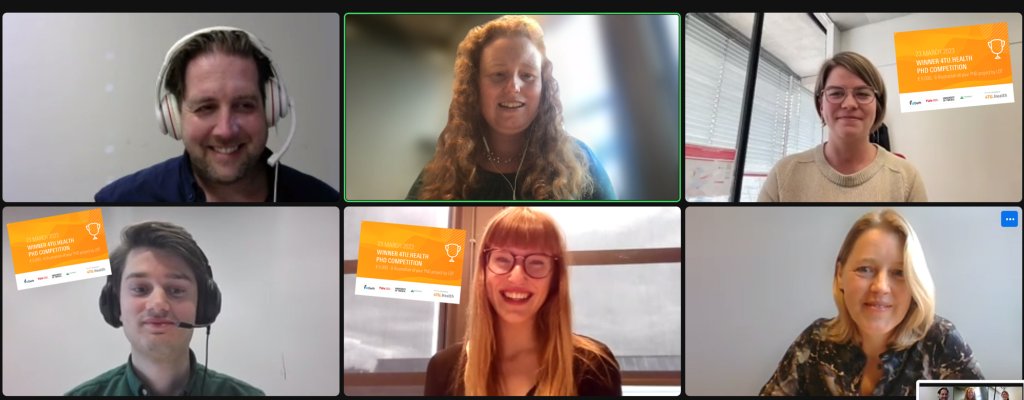On Thursday 23 March, three prizes were awarded during the finale of the digital 4TU.Health poster competition. This poster competition is part of the 4TU.Health collaboration. PhD students in the field of health and technology were challenged to present their research in an open, engaging way. All participants were given the opportunity to briefly present their poster and view other posters. The winning PhD student may use the prize to visit another TU or set up research together with another TU. This is the first year that this PhD competition is being organized within 4TU.Health.
45 PhD candidates from the four technical universities participated in this competition. The aim of the competition is to offer PhD students a platform for sharing their research, but also to identify possible future collaborations. Prior to the presentation, the posters were presented online. Thus, prior to the finale, PhD students assessed each other's work and provided suggestions for possible collaboration. In the finals, all participants were allowed to pitch, after which the best eight were allowed to pitch again for a larger group.
The eight finalists were: Marco Locarno from TUD. Nina Doorn, Pardis Farjam and Hugo Markus from UT. From TU/e Dennis van de Sande, Terese Helström, Lisanne Bergefurt and Emma Moonen pitched in the finale.

The three prizes went to:
- Hugo Markus – Unraveling crosstalk between neuroblastoma and bone marrow mesenchymal stromal cells
Neuroblastoma is a childhood tumor that often develops resistance in chemotherapy treatment. Understanding this mechanism for new therapeutic options is key in improving neuroblastoma patient survival. It is thought that the communication between neuroblastoma and mesenchymal stromal cells can lead to the resistance. This project takes the first step to unravel the roles of both cell types in this process.
- Emma Moonen - Wearable sweat sensing device for monitoring sweat rate from single glands in sedentary state
Monitoring patients after surgery is important to reduce serious complications. To improve patient monitoring, analysis of sweat of the patients is proposed. However, current devices for analysis of biomarker concentrations in sweat need a large volume of and cannot measure semi-continuously. This project proposed the first sweat sensing device that aims to monitor small volumes of sweat, of patients in a resting state.
- Nina Doorn – An in vitro and in silico neuronal network model to unravel genetic encephalopathies
Genetic neurological disorders are difficult to understand and hard to study. In vitro patient-derived neuronal networks offer a tool to investigate these disorders, but the signals obtained from these models are difficult to decipher. In this project, computerized in silico models are used to unravel what underlies these signals, enabling the discovery of disease mechanisms in these genetic encephalopathies.
About 4TU.Health
4TU.Health is a collaboration between the University of Twente (UT), Eindhoven University of Technology (TU/e), Wageningen University & Research (WUR) and Delft University of Technology (TU Delft), each with their own specific healthcare technology focus.



